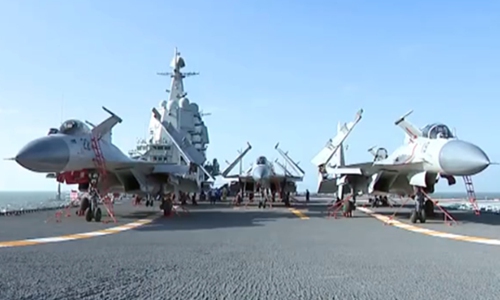HOME >> OPINION
US provocations on Taiwan will eventually backfire
Source:Global Times Published: 2019/12/25 13:18:40

China's second aircraft carrier sails through the Taiwan Straits into the South China Sea. Photo: screenshot from the Weibo account of the PLA Navy
Two US representatives on Monday introduced a bill in the Congress demanding to upgrade the director of the American Institute in Taiwan's (AIT) Taipei office to the rank of "Ambassador at Large," and the candidate will have to go through the Senate confirmation process as ambassadors to other countries are required to do.The AIT has a large presence that many American embassies abroad cannot match. Taiwan calls the director of AIT "ambassador," but the US has always referred to the post as director. And the director has long been appointed by the secretary of state, while American envoys abroad are nominated by the president and are subject to Senate confirmation.
Two members of the House of Representatives threw out the bill, which was clearly a provocative move. In the US system, Congress has played a prominent role to coerce China, passing laws that actually push the US administration to harm China's interests and passing non-binding bills that help the administration put pressure on China.
Now even professionals probably have no idea how many Taiwan-related bills have been passed or are yet to be passed by the US Congress. These days, anti-China bills are often passed by large majorities in Congress, creating a lure for those seeking publicity. This time, two members of the House of Representatives engaged in the so-called Taiwan Envoy Act. It is hard to say whether the two congressmen are also seeking attention by introducing the bill.
With so many anti-China bills, the US administration has a lot of cards to play on the Taiwan question. But what matters most is how the president and the rest of the government use them, because the implementation of the most egregious provisions of these laws is bound to cause serious tensions and even trigger crises in Sino-US relations.
The US must understand that although Taiwan is the easiest part to provoke the Chinese mainland, it is also the most risky spot for the US. It is precisely in the Taiwan Straits that China has the greatest capacity to counter US provocations, and its will and ability to defend its core national interests are strongest. If the US keeps "slicing salami" on the Taiwan question, it is bound to cut its own hand sooner or later.
China has two major threads in its game with the US on the Taiwan question. The first is to directly counter US provocation and make the latter pay a price for everything it does. The second is to increase pressure on the Taiwan side.
This is not a joke. The Chinese mainland has so far been restrained in the Taiwan Straits and has not stoked trouble internationally at the US weak spots. These have much to do with the US one-China principle on the Taiwan question. If the US were to abandon the principle, it would trigger a systemic reaction from Beijing, potentially depriving Washington of some of the key international cooperation it had hoped Beijing would offer. China's increased military pressure on Taiwan will put Washington in quandary.
It is hoped the US Congress isn't trying to stoke a future crisis between the US and China. To be honest, we don't think the US is ready for a US-China crisis related to Taiwan, nor do we think the Democratic Progressive Party authorities of Taiwan are ready for that. We see a bunch of politicians are making troubles without realizing the consequences. Hopefully the American system can somehow keep them in check and prevent them from dragging the US down along with them.
Posted in: EDITORIAL